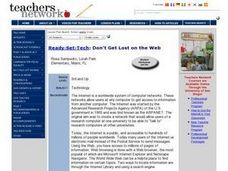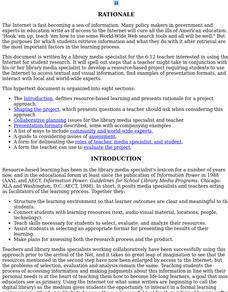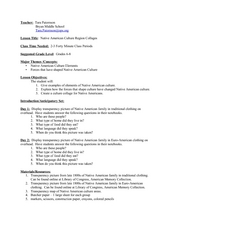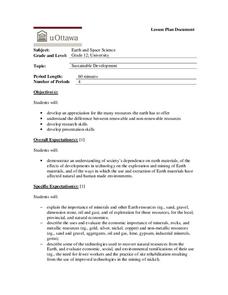Curated OER
Hedgerows
Hedgerows prevent soil erosion, capture pollutants running off fields, store carbon to help combat climate change, and provide homes for predators of many pest species. The biodiversity lesson begins with an activity that...
Curated OER
Where Do Animals Come From?
Learners use library search engines to research an animal and its origin. In this animal research lesson plan, students research their assigned animal using ProQuest. Learners then find the country of origin of the animal using a library...
Curated OER
The Three Major Monotheistic Religions
This activity gives students an opportunity to learn about the three major monotheistic religions in a fun and challenging way, while also allowing them to hone their library research skills. Students research one of the three religions....
Curated OER
Role Models- Grade 9
Ninth graders research Aboriginal role models. In this native studies lesson, 9th graders select leaders of the First Nations and Metis Nations of the Saskatchewan and research their contributions to society. Students create...
Curated OER
Reindeer Research
Young scholars research reindeer habitats and purposes. They investigate the historical significance of reindeer and the Christmas holiday. Finally, they write a short fictional story about reindeer using the information from their...
Curated OER
In the News
Fourth graders will use AlphaSmarts/Neos to create a one page newspaper in Word which features an early explorer. This lesson plan can be done entirely in the classroom. The students will perform research about the explorer prior to the...
Curated OER
Don't Get Lost on the Web
Scholars discuss purpose of search engines, define World Wide Web, become familiar with website addresses, demonstrate understanding of site updating, create a list of topics about which they would like more information, and visit at...
Curated OER
Finding Your Way in the World Wide Web
Researchers practice grouping items to explore the concept of a database. They apply these concepts to the WWW search engine format and consider why it is important to enter the most specific information.
Federal Reserve Bank
Financial Regulation: A Primer on the Dodd-Frank Act
Get the lowdown on the most sweeping financial regulatory reform since the Great Depression: the Dodd-Frank Wall Street Reform and Consumer Protection Act of 2010.
NPR
Female Olympians Lesson Plan
For every strong and determined female Olympian, there are millions of young girls watching and becoming inspired. Middle and high schoolers learn more about record-breaking and history-making Olympian women with a presentation from the...
Henry Ford Museum
You Can Be an Innovator ... Like Henry Ford
Why did Henry Ford want to invent a car for the masses? Why did Henry Ford locate his factory in Detroit? Why did Henry Ford encourage the idea of a 5-day work week? Young innovators find the answers to these and other question in a unit...
Middle Tennessee State University
The Invention of the Telephone
All of the people in your class would agree that life would be different without the invention of the telephone! Study Alexander Graham Bell's most famous and influential invention through the primary source document of his...
Seussville
Oh! the Places You'll Go!
Honor Dr. Seuss on his birthday with a read aloud of the story Oh! the Places You'll Go! and a variety of activities that inspire scholars to dream of their future endeavors. Readers take part in conversations, research the...
Curated OER
Library Media: Poetry
Fifth graders explore different kinds of poetry. They work in groups to collect different styles of poetry. Then they use charts to organize the attributes of various poems. Conclude the lesson by having each individual choose the style...
Novelinks
The Book Thief: Concept Analysis
Designed for teachers who plan on using Markus Zusak's The Book Thief, this packet includes background information about the author, themes addressed in and issues raised by the novel, a list of research and project ideas, and...
K5 Learning
The Whistle
Get a quick peek into the life of Benjamin Franklin with a resource with a comprehension activity that asks learners to read a short tale, respond to a series of questions based on the passage, and then to identify the moral of...
Curated OER
Rationale
Students consider the rationale behind using the Internet as a research resource tool. They develop a research project, consider how to access and assess new information and format their research for presentation to the class.
Curated OER
The American Dream
Students define the American dream. For this primary research lesson, students search the Library of Congress digital collections for primary sources regarding the ideal of the American dream. Students create presentation to...
Curated OER
American Indian Reservation Controversies
Students interpret historical evidence presented in primary and secondary resources. In this American history lesson plan, students research the reservation controversies of the 1870's. Students use problem based learning...
Curated OER
Native American Culture Region Collages
Students research various Native American tribes. In this Native American history instructional activity, students follow the provided rubric to create collages on the cultures of selected Native American tribes.
Curated OER
Sustainable Development
Twelfth graders explore the difference between natural and man-made environments. In this renewable resources lesson students evaluate the economic importance of resources.
Curated OER
Searching the Internet Beginners
Students explore how to research on the Internet. In this Internet research lesson, students research the Internet directories and answer questions about using Google. Students complete an evaluation sheet of the activity.
Curated OER
Author Study
For this author study worksheet, students and their parents use resources from the library or the Internet to research Marjorie Weinman Sharmat and respond to the 4 questions regarding information about her.
Curated OER
The Home Front (Circa 1863)
Learners interpret historical evidence presented in primary and secondary resources. For this American Civil War lesson, students examine sources and then write personal accounts of the war.























